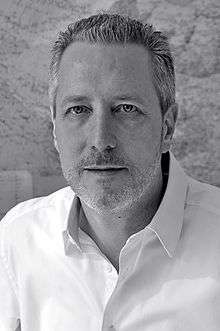Andreas Landwehr
Andreas Landwehr (born 22 March 1959) is a German journalist. Since 1993 he has been the German Press Agency bureau chief in Beijing. He was the winner, in 2011, of the Reetsma Liberty Award for journalistic freedom and independence.[1][2]

At the award ceremony his work was the subject of an enthusiastic tribute from the BBC's John Simpson: he was described as "an everyday hero [with a journalistic focus on] freedom and human rights", his reporting driven by "journalistic principals" unencumbered by restrictive preconceptions.[3]
Life
Andreas Landwehr was born in Düsseldorf. He attended the Alexander von Humboldt Gymnasium (secondary school) in nearby Neuss. Between 1978 and 1983 he studied Chinese at Tapei and Bonn, where he received his degree.[3] He joined the German Press Agency ("Deutsche Presse-Agentur" / dpa) in 1984. Between 1985 and 1990 he worked at the dpa head office in Hamburg, West Germany, where as "domestic affairs editor" ("Inlandsredakteur") he reported, from the west, on the unfolding changes that would lead to reunification. By the time reunification took place, however, he had been posted to Washington, D.C.[4] from where, as a foreign correspondent, he reported in the Gulf War and, two years later, on Bill Clinton's successful bid for the presidency.[5]
Since 1993 Landwehr has been the German Press Agency bureau chief in Beijing, from where he is responsible for reporting on Taiwan, Hong Kong, Mongolia and, most importantly, China.[2]
News highlights on which Landwehr has reported during his time in East Asia have included the death of Deng Xiaoping along with the return of Hong Kong and Macau to China in 1997 and 1999.[6] Other important themes have been the gradual democratization of Taiwan and the buildup to China's admission to the WTO. He was in Beijing for the SARS outbreak in 2002/03 and for the Summer Olympics in 2008. That was also the year in which he reported on the intensifying unrest in Tibet and on the Sichuan earthquake, also reporting nine years later on its 2017 echo.[7] He has interviewed many of the top Chinese leaders, such as Jiang Zemin, Zhu Rongji and Wen Jiabao. But he has also interviewed high-profile Chinese dissidents, including Bao Tong, Wang Dan and Wu'erkaixi. Landwehr has travelled extensively in China, getting to know the country: he has been able to visit Tibet several times. He has also undertaken a series of visits to North Korea.
As part of a dpa reorganisation in 2013 he took over the headship for the Press Agency's newly created East Asia Regional Network, meaning that his reporting remit also now embraces Japan and South Korea.[2]
Andreas Landwehr is a member of the German Press Agency's G20 team, reporting from the annual G20 summits on the East Asian statesmen and political leaders participating, development issues arising and Aid agency involvement.
Family connection
Andreas Landwehr's father was one of twelve children. An uncle, Gordian Landwehr, joined the Dominican Order in 1932 and moved to the German Democratic Republic in 1951, achieving prominence as a leading figure in the East German Roman Catholic church hierarchy.[8]
References
- "Ein Abend mit dem langjährigen China-Korrespondenten und Bürochef der Deutschen Presse Agentur (dpa), Andreas Landwehr". Mercator Institute for China studies. GoingPublic Media AG, München. Retrieved 11 January 2018.
- Andreas Landwehr, dpa. "Leben mit Marx und Mercedes .... China erfindet den reichen Kommunismus". Offiziell ist China ein sozialistischer Staat in Händen einer Kommunistischen Partei. Doch von Gleichheit ist im Reich der Mitte kaum etwas zu spüren. Die Erklärung der Machthaber: Noch fehlt der Reichtum, um sich den Kommunismus leisten zu können. n-tv Nachrichtenfernsehen GmbH, Köln. Retrieved 11 January 2018.
- "Preisträger des Reemtsma Liberty Award 2011 ist der dpa-Journalist Andreas Landwehr" (PDF). Pressemitteilung. Reemtsma Cigarettenfabriken GmbH (Liberty Award), Hamburg. 17 March 2011. Retrieved 11 January 2018.
- "dpa-China-Korrespondent Landwehr erhält "Liberty Award"". Die Zeit (online). 17 March 2011. Retrieved 11 January 2018.
- Andreas Landwehr (17 July 1992). "Polit-Karnetal in New York: Clinton am ersten Ziel seiner Träume". Neues Deutschland (online). Retrieved 11 January 2018.
- Andreas Landwehr (14 December 1999). "Macau in der Rezession". Die Auswirkungen der Asienkrise und Kämpfe rivalisierender Gangster bremsen die Wirtschaft der portugiesischen Enklave in China. Gerade deswegen blickt Macau dem Handover optimistisch entgegen – wenn auch mit einer gesunden Portion Skepsis. Der Spiegel (online). Retrieved 11 January 2018.
- Andreas Landwehr (10 August 2017). "In China kommt die Erde nicht zur Ruhe". Nordwest Zeitung (online). Retrieved 11 January 2018.
- "Sein Predigen machte DDR-Obere nervös". Der Leipziger Dominikanerpater Gordian Landwehr wäre am 30. Dezember 100 Jahre alt geworden. Pater Ralf Sagner erinnert an den DDR-weit bekannt gewordenen Prediger. St. Benno Buch und Zeitschriften Verlagsgesellschaft mbH (St. Benno-Verlag GmbH) (Tag des Herrn), Leipzig. 21 December 2012. Retrieved 11 January 2018.